14. Ida (2014, Poland)
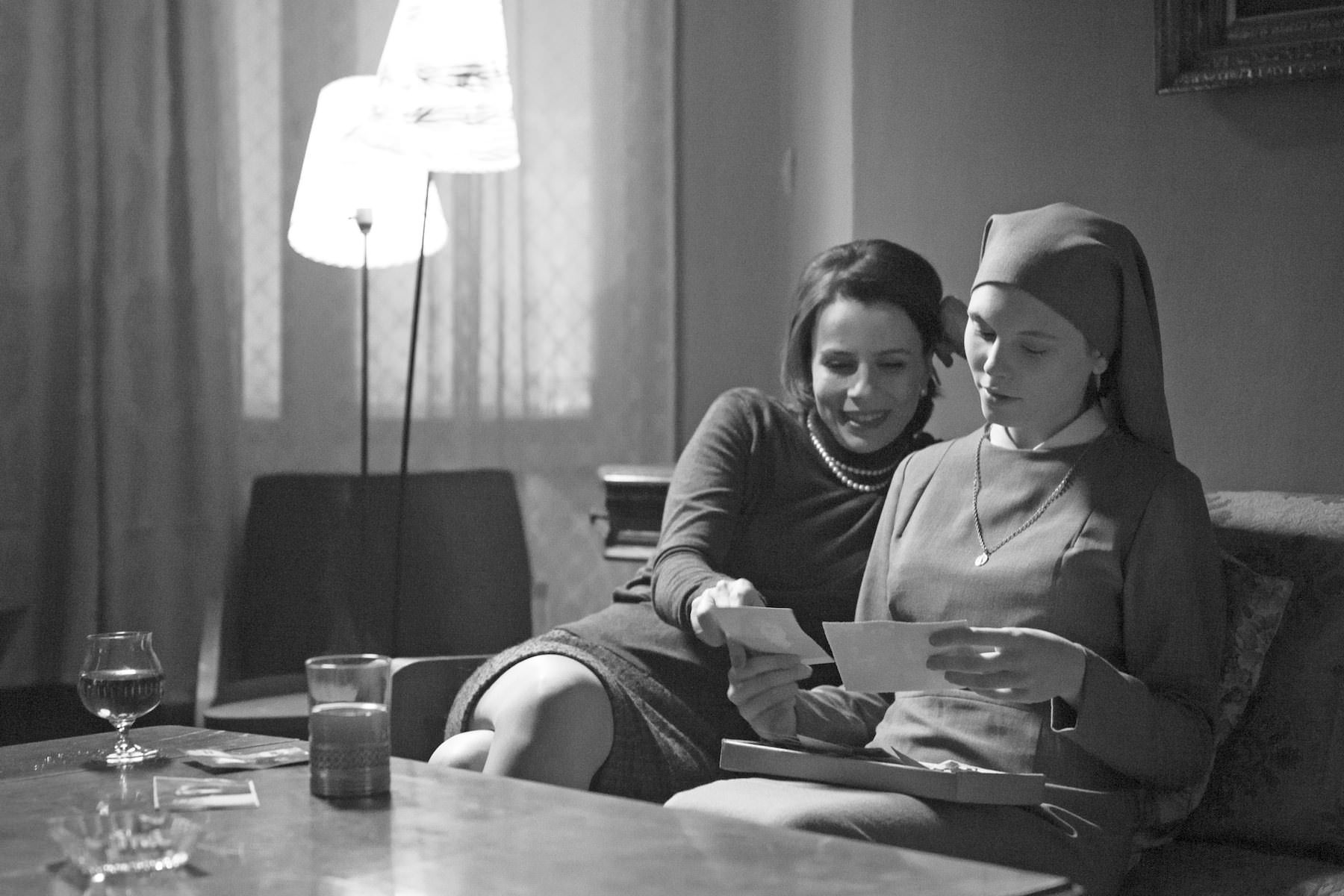
It takes a lot to impress the seen-it-all modern art house crowd and for a new art house film to become a sensation but the Oscar winning (among many other honors) Polish drama Ida managed to do just that.
Set in 1962 Poland, the film, shot in black and white and in the old Academy standard ratio (1:33 to 1) and also feels like an Eastern European film of that awakening period.
Only the crispness of the images, achieved with new technology, gives away the fact that it’s a modern film. The story centers on Anna, a young novice nun ordered to go and visit a never-seen aunt before taking her final vows.
The aunt, a former Communist prosecutor who drinks, smokes, talks touch and has “been around” is a revelation in more ways than one.
Within the first few minutes of their meeting she informs the orphaned Anna that her name is really Ida Lebenstein and that she is the Jewish daughter of a couple who died in the Holocaust!
The aunt ropes Ida into a mission to discover exactly what happened to the parents. Along the way the worldly, carnal woman tries to persuade the girl into delaying her vows and discovering what life has to offer outside the convent walls. Ida is a fascinating on the theme of identity and just what makes the human being.
There are fine performances by Agata Trzebuchowska in the title role and Agata Kulesza as the aunt. The adroit direction was courtesy of Paweł Pawlikowski,
Polish born but taken to England at a young age. He had been a promising film maker since the 1990s but this was his first film to be shot in his native land and language. It was also his breakthrough hit. He has yet to release a follow-up but, when he does, it will be greatly anticipated.
15. Force Majeure (2014, Sweden)
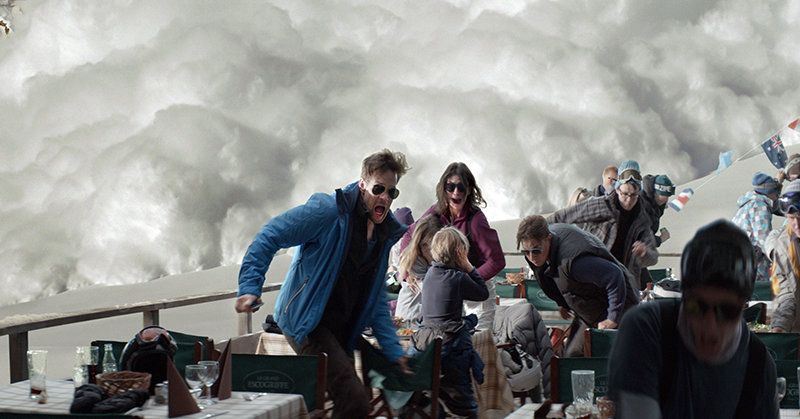
Mixing high drama and comedy is never easy but Force Majeure is an excellent Swedish entry which convincingly manages to get laughs out of a potentially unfunny situation.
A family with young children is vacationing at a ski resort. During their stay the management creates what is termed a “controlled avalanche” for safety reasons. However, the event goes out of control and the husband runs from the patio where the family is having lunch….leaving his wife and children behind to face the oncoming snow.
The crisis of the snow is averted but the wife hands the husband a crisis of his own in the wake of his cowardice. Among other things, she tells every friend they run across at the resort about the whole thing, knowing full well her husband’s embarrassment. He tries to defend himself except…well, he hasn’t been an ideal husband and he, in fact, was running away and gave them no thought.
However, as both parties and their friends discover, after a number of contortions, human nature is far from perfect and things can happen to anyone and behavior of all kinds is inherent in virtually every human being.
The film was only the fourth fiction feature of Reuben Ostlund, who had made a name for himself with shorts and documentaries. The fine ensemble cast included Johannes Bah Kuhnke, Lisa Loven Kongsli, Clara and Vincent Wettergren, Kristofer Hivju, and Fanni Metelius, none well known outside of Europe but expert farcical comics all the same.
Though the Academy passed on it, the film did well on the European award circuit, winning a major prize in the Un Certain Regard section of that year’s Cannes Film Festival. (By the way, the title translates out to “act of nature”, which can happen to anyone.)
16. Leviathan (2014, Russia)

Russian cinema has had a rather odd history. There have been glittering highlights (such as the works of those great artists Sergei Eisenstein and Andre Tarkovsky) but lots of political oppression and very many propaganda films dulled the perceptions of country’s film making on the whole.
However, the winds of political change brought the promise of new life to the country’s film industry. One of the most exciting new lights of the Russian (not Soviet) film industry is Andrey Zvyagintsev, best remembered by many for the excellent 2003 film The Return. However, the Oscar nominated Leviathan (which also won for its script at Cannes) is also a memorable film to place beside that triumph.
Both films are expert black comedies that edge into dark territory indeed. Leviathan has struck many as a modern interpretation of the Biblical book of Job. Simple garage mechanic Kolya (Aleksei Serebryakov) has an equally simple life with his wife Lilya (Elena Lyadova) and teenage son Roma (Sergey Pokhodyaev), though his quick temper causes him trouble.
To that end, his temper is rising indeed as his town’s corrupt mayor (Roman Madyanov) is trying to buy his house for a grossly unfair price for reasons he won’t reveal.
This sounds like one of those populist films about the little people scoring a victory over the powers that be. It isn’t. Kolya rebuffs the takeover with the help of his legal brain best friend Dima (Vladimir Vdovichenkov)but the cost turns out to be EXTREMELY high and his life starts to resemble a row of falling dominoes.
This could well have been a high tragedy in other hands but the director-writer is very sure and know just how to keep the dramatics this side of ruining the absurd comic aspects of Kolya’s downfall. Many may not think of the Russians as being a barrel of laughs but this much acclaimed and honored film shows that is not necessarily true.
17. Two Days, One Night (2014, France)
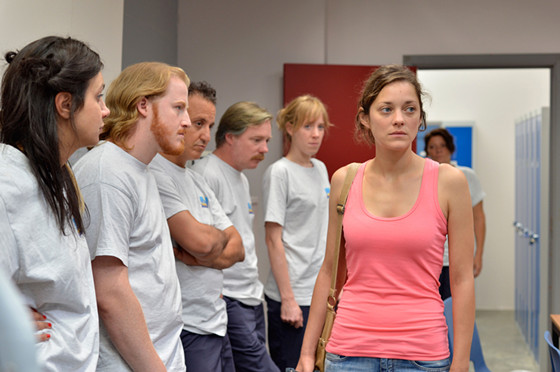
French actress Marion Cotillard made Academy history in 2007 when she became the only actor to date to win an Oscar in a French language film for her extraordinary performance as the great singer Edith Piaf in La Vie En Rose.
Those in charge in Hollywood quickly brought her to town and, though she has had some good moments in Hollywood (mostly better than her films there) it took another trip back home to get her renewed Academy attention. She signed on under the award winning brother team of Luc and Jean-Pierre Dardenne for one of their patented gritty looks at the extreme travails of the lower paid working class of Europe.
In this film, the actress deglamourizes to play Sandra, a young single mother who is now ready to return to work after a lengthy illness. Alas, not all at the workplace is as she left it.
The management, with presumably good intentions, did not fill her job while she was gone but, instead, parceled it out to her co-workers, with commensurate hikes in salary to compensate. Now her peers don’t want her back.
Nothing personal, they just want to keep the much needed money. Her employers give her two days to talk the co-workers into changing their minds or she will lose her quite essential job.
Cotillard is superb as the desperate woman, who knows that she has done nothing to deserve this situation but also understands why the others feel as they do.
As usual with the brothers’ films, the acclaim was great, though the Academy, as usual, didn’t see it that way. However, the difference with this film is the star turn in opposition to the little known actors who usually are at the center of their films. It also helps enormously that the makers and the actress helped the film come to a realistic solution which wasn’t a total downer.
18. Son of Saul (2015, Hungary)
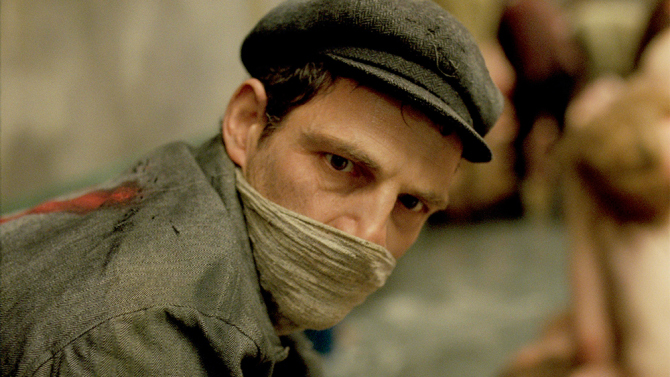
For such a small country, Hungary has given a lot to the cinematic world. Not only has the native Hungarian film industry had a generally excellent history but many Hungarian immigrants have contributed mightily to the film culture of other countries (including the Korda brothers, Michael Curtiz and Dimiti Tiomkin).
An extremely promising member of the current Hungarian film generation is Laszlo Nemes, who truly hit the jackpot with his debut film, Son of Saul, only the second Hungarian film to actually win the Best Foreign Film Academy Award.
The picture is an utterly unsparing tale of a little less than two days in the life of Saul (Geza Rohrig), who is what was term a “Sonderkommando” in the concentration camps, in this case Auschwitz.
Simply put, these unlucky men were given the job of finding and removing any valuables on the bodies of inmates gassed to death (to be turned into the camp officials) and then dragging the bodies to the crematorium.
Saul is impassive until he finds the body of a young boy is still alive and must watch as the camp doctor coldly kills him. Saul wants to bury the body in the prescribed Jewish way and tries to enlist the camp rabbi to help him, though it could mean death for both.
There is much more to the tale as the camp is rife with rebellious turmoil among both prisoners and those running the camps, who are terrified about the direction the war is taking.
It also turns out that the dead boy means more to Saul than just another murdered child’s body. This film is a superior production both as a period film and as a document of a horrendous time. The young director-writer shows both surprising power and skill. His next film is still in the works but it is greatly awaited.
19. Mustang (2015, France)
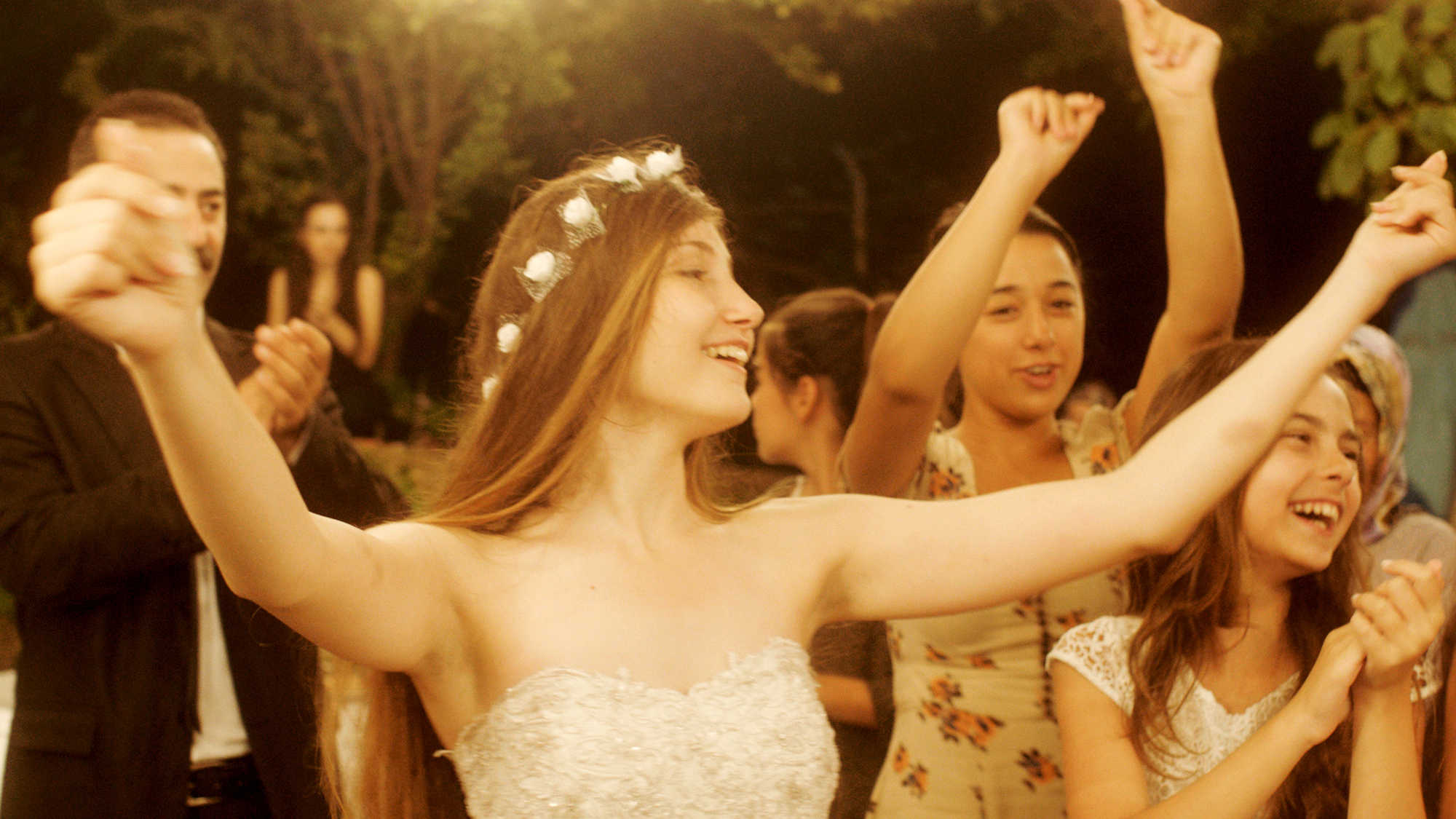
France is not only one of the prime countries of Europe but also, perhaps, the most European as such. It is a bit of an irony that, since the country had so many third world ties in the colonial era, it is also home to many varying peoples of origins, creeds and faiths.
Thus Mustang, a film set in a village in Turkey was, in an economic sense, a French film directed by a French woman of Turkish extraction and birth, Deniz Gamze Erguven.
The plot concerns five young sisters who flirtatiously, but rather innocently, play with the local boys coming and going from school. However, their older and very traditional relatives, especially the grandmother who rules over them, disapproves. She decides that it is now time to start marrying the very young women.
It also turns out that the repressive uncle living in the home is sexually abusing more than one of the sisters. Where an earlier film might have emphasized the tragic plight of women in such a land, this one won’t go that route. The sisters act out in solidarity and decide that they will break the pattern, no matter the cost.
This concept was a breath of fresh air and the director-writer skill in presenting it was much commented on and acclaimed. The common thought was that it took a woman to tell such a story.
Several awards and nominations, including one from the Academy, followed. Thought Erguven had been working behind the scenes in films for years, this was, in fact, her debut as director. The world is now waiting for her next move.
20. 45 Years (2015, Great Britain)
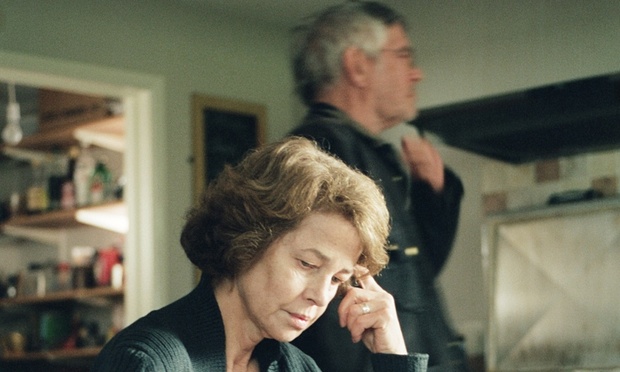
If nothing else, 45 Years will be noted as the film which brought Charlotte Rampling, a stable of British and art house cinema (and TV and commercial films to boot) since the mid 1960s, some Oscar recognition (a nomination, though, not the award). However, this film has much more than that to recommend it.
The plot pairs her with another British stalwart since the 60s, the acclaimed stage and screen actor Tom Courtney. The two play a married, childless, couple who are going to go all out for anniversary number 45 after missing out on 40 due to the husband’s heart surgery. Alas, big anniversaries seem to be the bête noir of these two.
Just before the festivities are due to commence, the husband receives a letter from German authorities. It seems that after all these many years, the body of the woman the man once loved, who had vanished during a mountain climbing expedition during the 60s has been discovered.
It also happens that she was pregnant by the man when she died and they had pretended to be husband and wife on that trip, hence him being sent the letter. The whole story unravels to reveal that the woman was the great love of the husband’s life and he was not at all the reason the subsequent marriage was childless. The wife, having to accept the fact that she was and is just a make-do second best is now left to reexamine virtually her whole adult life.
It is a hopeful sign that cinema, in places other than Hollywood, anyway, have begun to look at the lives of those who are no longer youthful.
The sadly mature tale explores how people quite often have to reconcile the cards that life has dealt them. The wife can’t be really mad since the husband’s relationship with the woman happened before she herself met him but the revelation will never allow her to be the same again.
The husband, who had put the memory away, now must live with its resurrection and the thought of what might have been. The two actors playing the characters couldn’t be better either separately or jointly.
Helming this fine throwback to the glory days of British art cinema is Andrew Haigh. He has been a top film editor since the late 1990s (he regularly edited the films of director Ripley Scott) both before and after his debut film, the short Markings, in 2005. His breakthrough came with the much admired LGBT drama Weekend in 2011.
This film was a somewhat more mainstream commercial hit and a big favorite of viewers and critics. It’s many awards and nominations bid well for the director’s career. He does not have a film planned for release until 2017 but his past record will mark it as one to anticipate.